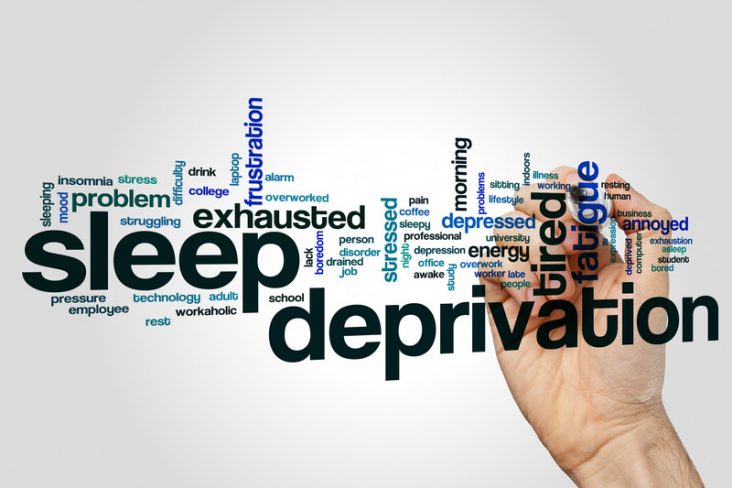Sleep deprivation occurs when someone does not get a healthy amount of sleep. People vary in how little sleep is needed to be considered sleep-deprived. Some people such as older adults seem to be more resistant to the effects of sleep deprivation, while others, especially children and young adults, are more vulnerable.
Simply defined, sleep is the prolonged period of unconsciousness that typically occurs for 6-9 h each night. We spend 1/3 of our life in bed. Sleep is divided into two stages, non-rapid eye movement (NREM) and rapid eye movement (REM). What is the difference between them?
REM sleep
Rapid eye movement sleep is one of the deepest of all the stages of sleep. It usually takes up about 25 percent of your sleep time. REM comes in short bursts at first and lasts for only a few minutes but then it gradually stretches into longer time segments. REM is good for your memory. When in REM the brain takes information from the short term memory and moves it to the long term memory. The body is paralyzed at this stage. The eyes will move from side to side very quickly even though they are closed. Heavy dreaming activity is going on.
NREM sleep
NREM includes all of the stages of sleep other than REM. It is the dominant type of sleep by time and there is no dreaming. The body is able to move and the eyes remain still. These stages of sleep vary in depth from stage 1 (lightest) to stage 4 (deepest). Stages 3 and 4 are considered deep sleep and this is where most of the physical restoration occurs. Growth hormone is produced and cellular repair begins in NREM.
How much sleep do you need?
The National Sleep Foundation (NSF) made these recommendations in 2015 for appropriate sleep durations for specific age groups:
- Newborns (0 to 3 months): 14 to 17 hours each day
- Infants (4 to 11 months): 12 to 15 hours
- Toddlers (1 to 2 years): 11 to 14 hours
- Preschoolers (3 to 5 years): 10 to 13 hours
- School-age children (6 to 13 years): 9 to 11 hours
- Teenagers (14 to 17 years): 8 to 10 hours
- Adults (18 to 64 years): 7 to 9 hours
- Older adults (over 65 years): 7 to 8 hours

The main symptom of ongoing sleep loss is excessive daytime sleepiness, but other symptoms include:
- moodiness
- fatigue
- irritability
- depressed mood, a decreased willingness to solve problems
- reduced tendency to think positively
- difficulty learning new concepts
- forgetfulness
- poor impulse control
- inability to concentrate or a “fuzzy” head
- lack of motivation
- clumsiness
- increased appetite and carbohydrate cravings
- reduced sex drive

Sleep deprivation can negatively affect a range of systems in the body.
- Not getting enough sleep prevents the body from strengthening the immune system and producing more cytokines to fight infection. This can mean a person can take longer to recover from illness as well as having an increased risk of chronic illness.
- Sleep deprivation can also result in an increased risk of new and advanced respiratory diseases.
- A lack of sleep can affect body weight. Two hormones in the body, leptin and ghrelin, control feelings of hunger and satiety, or fullness. The levels of these hormones are affected by sleep. Sleep deprivation also causes the release of insulin, which leads to increased fat storage and a higher risk of type 2 diabetes.
- Sleep helps the heart vessels to heal and rebuild as well as affecting processes that maintain blood pressure and sugar levels as well as inflammation control. Not sleeping enough increases the risk of cardiovascular disease (hypertension, heart attacks)
- Insufficient sleep can affect hormone production, including growth hormones and testosterone in men.
The good news is that most of the negative effects of sleep deprivation reverse when sufficient sleep is obtained. The treatment for sleep deprivation is to satisfy the biological sleep need, prevent deprivation and “pay back” accumulated sleep debt.
If you cannot get to sleep, experts recommend carrying out an activity such as reading until you feel sleepy.
Some suggestions for good sleep habits (the so-called “sleep hygiene”) include:
- going to bed only when tired
- following a routine for bed and wake-up times, keeping it consistent every day of the week
- avoiding eating 2 to 3 hours before bedtime
- if unable to fall asleep after 20 minutes of trying, going to another room and trying to read until feeling sleepy, then returning to bed
- engaging in regular exercise during the day
- keeping the bedroom quiet, dark and a comfortably cool temperature
- turning off electronic devices when you go to bed

Sleep deprivation can be linked to serious accidents and poor job or school performances. It can substantially lower an individual’s overall quality of life. Lack of sleep disrupts the brain’s ability to balance emotions and thinking abilities, lowers the body’s natural defenses, and increases the chances of developing chronic medical problems.
Sleep deprivation shows consistently bad outcomes. Nothing is reported to be beneficial from sleep deprivation!
There is no substitute for restorative sleep. Great care should be taken to prevent ongoing sleep deprivation in individuals of all ages.

